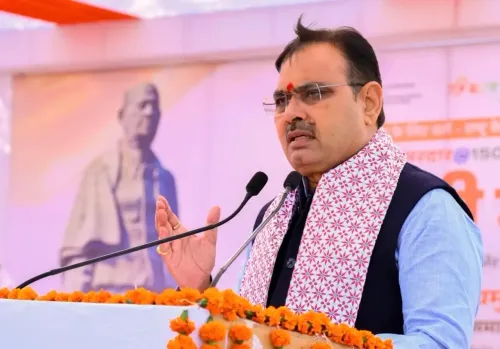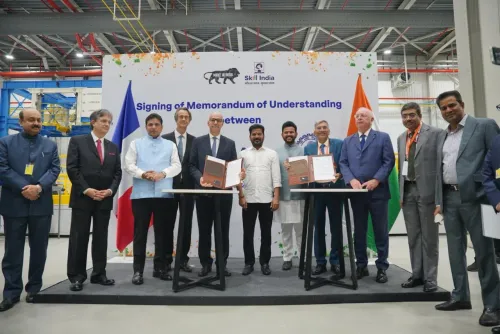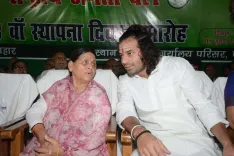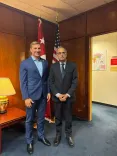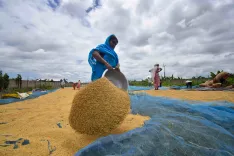How Did PM Modi Inspire Duty-Driven Vision for Viksit Bharat on Constitution Day?
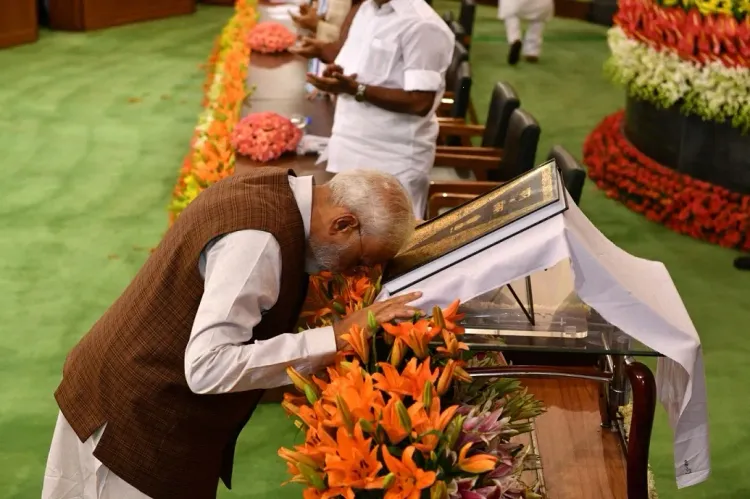
Synopsis
Key Takeaways
- Constitution Day is a reminder of India's democratic values.
- PM Modi calls for prioritizing duties for national growth.
- Significant anniversaries align with this year's celebrations.
- The Constitution empowers citizens to dream and achieve.
- Education plays a key role in instilling civic responsibility.
New Delhi, Nov 26 (NationPress) Prime Minister Narendra Modi penned a heartfelt letter to the people of India on Constitution Day, reflecting on the significant moment when the Indian Constitution was adopted in 1949. He articulated a progressive vision for a 'Viksit Bharat' (Developed India), calling on every Indian to prioritize their duties as the nation approaches its 100th year of Independence.
The Prime Minister reminded that in 2015, the Government of India officially recognized November 26 as Constitution Day, honoring not just the nation's foundational document but also the democratic values it upholds.
In his letter, PM Modi highlighted the Constitution's crucial role in empowering ordinary citizens to achieve great responsibilities. He shared poignant memories that deepened his respect for democratic systems.
“November 26 is a proud day for all Indians. On this date in 1949, the Constituent Assembly adopted the Constitution of India, a revered document that continues to steer our nation's path with purpose and clarity,” his letter stated.
“The strength of our Constitution allowed someone like me, from a modest background, to serve as the Head of Government for over 24 years. I vividly recall my first visit to Parliament in 2014, bowing down to the steps of our esteemed temple of democracy. Again, in 2019, after the election results, I entered the Central Hall of Samvidhan Sadan, placing the Constitution on my forehead in deep respect. This Constitution has empowered many others, like myself, to dream and strive for those dreams.”
The letter also paid homage to the founders of the Indian Constitution, including Rajendra Prasad, B.R. Ambedkar, and numerous remarkable women from the Constituent Assembly who shaped its principles. PM Modi recalled significant events like the Samvidhan Gaurav Yatra in Gujarat during the Constitution's 60th anniversary and the recent special Parliament session celebrating the 75th anniversary—moments that saw extraordinary public involvement.
Describing this year's Constitution Day as particularly significant, he pointed out its alignment with historic anniversaries: the 150th birth anniversaries of Sardar Vallabhbhai Patel and Bhagwan Birsa Munda, the 150th anniversary of Vande Mataram, and the 350th martyrdom anniversary of Guru Tegh Bahadur Ji. These occasions, he noted, serve as reminders of the fundamental importance of duties in national life—a principle embedded in Article 51A of the Constitution.
Quoting Mahatma Gandhi, PM Modi reiterated that rights emerge from duties, asserting that fulfilling these duties is essential for achieving social unity, economic development, and national cohesion.
Looking forward, the Prime Minister reflected on the transformative journey India is about to embark upon. He acknowledged that 25 years of the 21st century have already elapsed, and in just over two decades, India will celebrate a century of Independence. The year 2049 will also mark a hundred years since the adoption of the Constitution—a milestone that requires preparation starting today.
He urged citizens to embrace duty as a core value for personal and national growth, emphasizing that the choices made today will influence future generations.
The Prime Minister also highlighted the duty to strengthen democracy through voting, suggesting that educational institutions observe Constitution Day by recognizing first-time voters who turn 18, fostering a sense of pride and responsibility among young citizens.
In closing, PM Modi called upon all Indians to recommit to building a nation grounded in constitutional values and driven by shared responsibilities.
“On this Constitution Day, let us reaffirm our commitment to fulfilling our duties as citizens of this remarkable nation. By doing so, we can all actively contribute to the creation of a Viksit Bharat that is developed and empowered,” PM Modi concluded.

